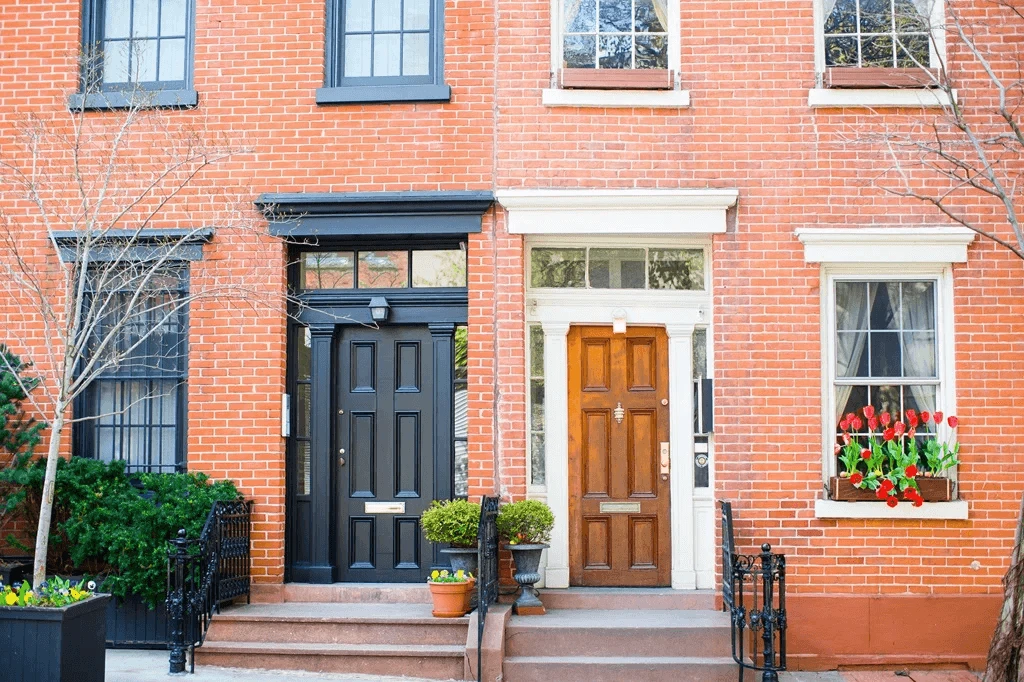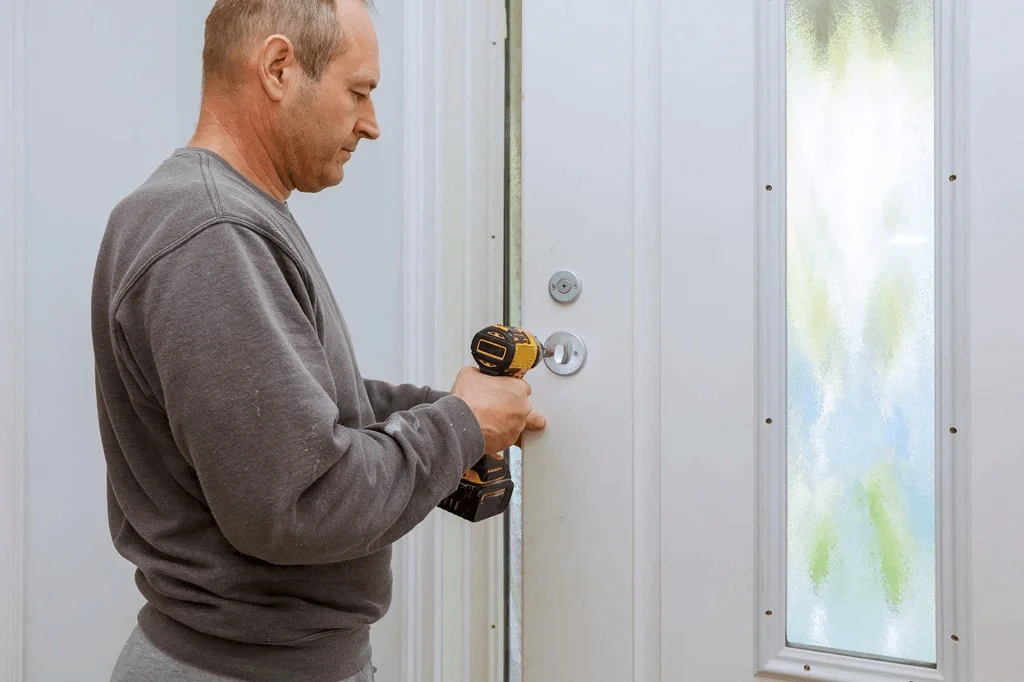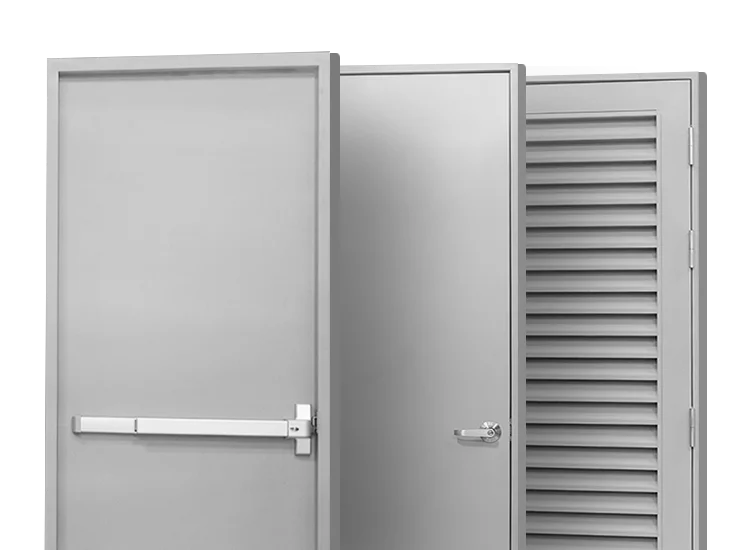Doors play a crucial role in every home, whether they’re for the backyard, bedroom, living room, or any space in between. They not only serve as functional elements, but also reflect a homeowner’s personal style and enhance the overall ambiance of the house. Plus, regardless of the type, doors provide essential security, ensuring a safe and protected living space.
If you’re renovating your current space or building your dream home, choosing the right types of doors becomes even more important. In this blog, we’ll discuss the different kinds of doors you should invest in, along with the common materials used in their construction. We’ll also share tips to heed on how to select the best doors for your homes.
Different Types of Doors
When it comes to choosing doors for your home, the variety can be overwhelming as each kind of door offers unique benefits and suits diverse needs and aesthetics. Let’s explore some popular types of doors and what makes them unique.
1. French Doors
Typically featuring multiple glass panels, French doors consist of a pair of doors that open outwards or inwards which add elegance and sophistication to any home. You can use these types of doors to create a seamless connection between indoor and outdoor spaces, such as living rooms and patios. French doors allow natural light to flood in, brightening up your interior.
2. Sliding Doors
Sliding doors offer versatility and save space. They operate by sliding horizontally along a track, making them ideal for areas where swinging doors would be impractical. With large glass panels, sliding doors provide an unobstructed view and easy access to the outdoors. They bring a modern, sleek appearance to your home, but you need to maintain the tracks to ensure cleanliness and functionality.
3. Hinged Doors
Considered the most traditional and widely used type of door, hinged doors work well in any room and present a secure and straightforward solution. They attach to a door frame with hinges on one side, allowing the door to swing open and closed. However, hinged doors require enough space to swing open, which might not be ideal in tight areas.
4. Dutch Doors
Also known as stable doors, Dutch doors are split horizontally so that the top and bottom halves can open independently. This unique design lets you open the top half for ventilation while keeping the bottom half closed for safety and security. Apart from its charm and practicality, Dutch doors bring a rustic, farmhouse feel to your home.
5. Casement Doors
Casement doors resemble casement windows, hinged at the sides and opening outwards like a book. They often feature large glass panels, making them perfect for areas where you want to maximize natural light and outdoor views. In addition, casement doors seal tightly when closed, offering good energy efficiency and security. You typically see them used for patio doors and exterior entries.

Common Materials Used for Doors
Aside from the types of doors you’ll invest in, it’s important to carefully consider the materials they’re made from. Take note that the choice of door material significantly impacts your home’s aesthetics, security, energy efficiency, and maintenance requirements. Below are some of the common materials used for doors.
1. Steel Doors
Known for their durability and security, steel doors resist warping, cracking, and weather damage. These qualities make them an ideal choice for exterior doors. Plus, steel doors can be insulated to improve energy efficiency and are often more affordable than solid wood options. However, they dent or scratch more easily than some other materials.
2. Wood Doors
Wood doors offer timeless appeal and versatility, allowing you to paint or stain them to match your decor. From traditional to contemporary, these types of doors come in a variety of styles. Moreover, wooden doors provide excellent insulation and add a touch of elegance to any room, but require regular maintenance to protect against moisture and pests.
3. Glass Doors
Similar to sliding glass and French doors, glass doors bring in natural light and create a sense of openness, enabling rooms to feel larger and brighter. While they contribute a modern touch, you might need additional security measures. They can also be less energy-efficient without proper glazing.
4. Aluminum Doors
Aluminum doors are lightweight, strong, and resistant to rust and corrosion. They’re perfect for sliding patio doors, offering a variety of finishes and colors. Despite their sleek, modern appearance, these types of doors may not provide the same level of insulation as wood or fiberglass doors.
5. Fiberglass Doors
Fiberglass doors combine the look of wood with the durability of steel. They resist dents, scratches, and moisture, making them a low-maintenance and long-lasting option. You can insulate them for energy efficiency and choose from various styles and finishes.
The Importance of Choosing the Right Types of Doors for Your Home
As mentioned, doors are not just functional elements but also integral parts of your home’s security, energy efficiency, and overall ambiance. Hence, understanding the importance of choosing the right types of doors helps you create informed decisions.
First and foremost, doors significantly contribute to your home’s aesthetic appeal. The style, material, and design of your doors play a vital role in improving the character of your living space. Additionally, each type of door serves different purposes, such as sliding doors being ideal for areas with limited space and French doors establishing a seamless connection between indoor and outdoor spaces.
Moreover, doors are a critical component of your home’s security. Strong, well-built doors, especially those made from materials such as steel, provide a level of security that can deter intruders and protect your family and belongings. Similarly, your doors’ durability also affects their longevity and maintenance requirements. Thus, going for high-quality, durable doors lets you save money on repairs and replacements in the long run.
Another important consideration when selecting doors is energy efficiency. Choosing doors with good insulation properties reduces heat loss in the winter and heat gain in the summer, leading to lower energy bills. Furthermore, doors contribute to sound insulation in your home. Solid doors and those with good sealing properties help lessen noise from outside, providing a quieter and more peaceful living environment.

How to Choose the Best Doors
Choosing the best doors for your home involves considering several key factors to ensure they meet your needs and preferences. Here are some tips to guide you in making the right choice.
1. Assess your needs.
Start by evaluating the specific needs of each room or entryway. Determine the door’s primary function, whether it’s for interior use, exterior entry, patio access, or storage. Knowing the purpose will help you narrow down your options.
2. Consider the door’s material.
The choice of material is critical as it affects the door’s performance, durability, and maintenance needs. Steel doors feature high security but may require occasional maintenance, while wood provides a classic look but needs regular care. Understanding these factors helps you select a door that suits your lifestyle and budget while ensuring long-term satisfaction.
3. Evaluate energy efficiency.
For exterior doors, prioritize energy efficiency. That being said, invest in doors with good insulation properties as proper insulation helps maintain a comfortable indoor temperature, reduce the strain on heating and cooling systems, and lower energy costs.
4. Check security features.
Security should be a top priority, especially for exterior doors. Doors with solid cores and robust locking mechanisms provide enhanced security, protecting your home and family from intruders. Likewise, consider the door’s thickness, as thicker doors tend to offer better security and resistance to forced entry.
5. Select style and design that match your home.
The door’s style and design should complement your home’s architecture and interior decor. Whether you prefer traditional, rustic, or contemporary designs, opt for doors that boost your home’s overall aesthetic appeal. Plus, don’t forget to pay attention to details involving panel design, finishes, and hardware.
6. Consider space and functionality.
Think about the available space and the door’s functionality as they’re essential for ensuring smooth operation and convenience. Doors that save space or present specific functionalities can significantly improve the usability of a room or entryway.
7. Prioritize sound insulation.
If noise reduction is a priority, look for doors with good soundproofing qualities as they help reduce noise transmission, thereby providing a quieter, peaceful, and comfortable indoor space. Solid wood and solid core doors typically offer better sound insulation compared to hollow core doors.
8. Consider your budget.
Lastly, consider how much you are willing to invest in your doors. While high-quality doors might be more expensive initially, they often provide improved durability, security, and energy efficiency. These make them a worthwhile investment in the long run.
Why Choose Steel Doors
If you’re a homeowner seeking enhanced security, durability, and energy efficiency, choosing steel doors is a smart decision and valuable investment. These doors underscore unparalleled strength and resistance to forced entry, proving an excellent choice for improving home security. Their robust construction ensures that they can withstand significant impact and harsh weather conditions, providing long-lasting protection against intrusions and the elements.
Another compelling reason to choose steel doors is their low maintenance and energy efficiency. Unlike wooden doors which require regular painting or staining, steel doors come with a factory-applied finish that resists rust and corrosion. This saves you time and effort in upkeep, allowing you to enjoy a door that looks great with minimal care.
Finally, many steel doors are insulated with high-density foam, providing excellent thermal insulation that helps regulate indoor temperatures and lessen energy consumption. This energy efficiency not only contributes to a more comfortable living environment but also leads to lower utility bills, making steel doors a cost-effective and environmentally friendly choice.

Invest in Steel Doors for Your Home with Janus Steel OPC
Now that you have an idea about the different types of doors, you can make a more informed decision when choosing the right door for your home. Whether you prioritize security, durability, energy efficiency, or aesthetic appeal, there’s a wide range of options available to suit your needs. But if you plan to opt for steel doors, Janus Steel OPC has got your back!
For almost 10 years, we’ve established our reputation as a leader in the steel door fabrication industry, providing our clients with secure, aesthetically pleasing, and customized steel doors that surpass set standards. From Ilocos Norte to Davao, we have expanded our steel door manufacturing catering to a diverse range of projects nationwide, including commercial, industrial, and residential sectors. Contact us today to help you find the perfect door to complement your home’s style and meet your practical requirements.





